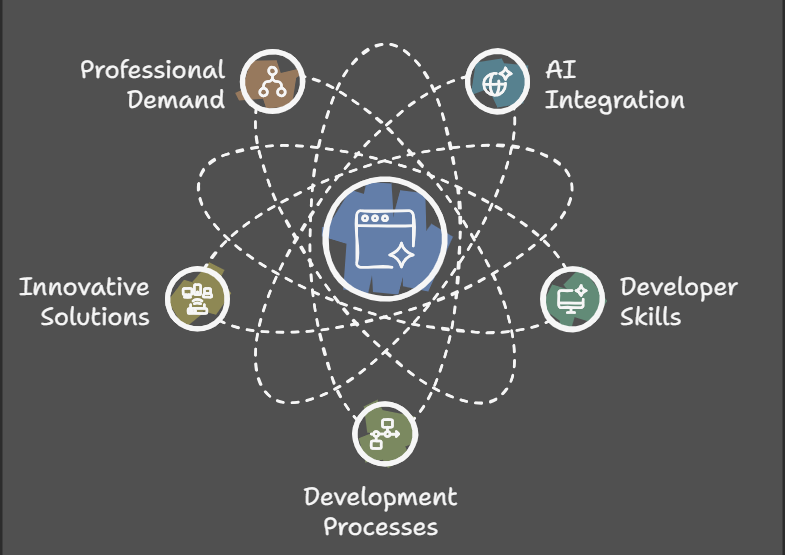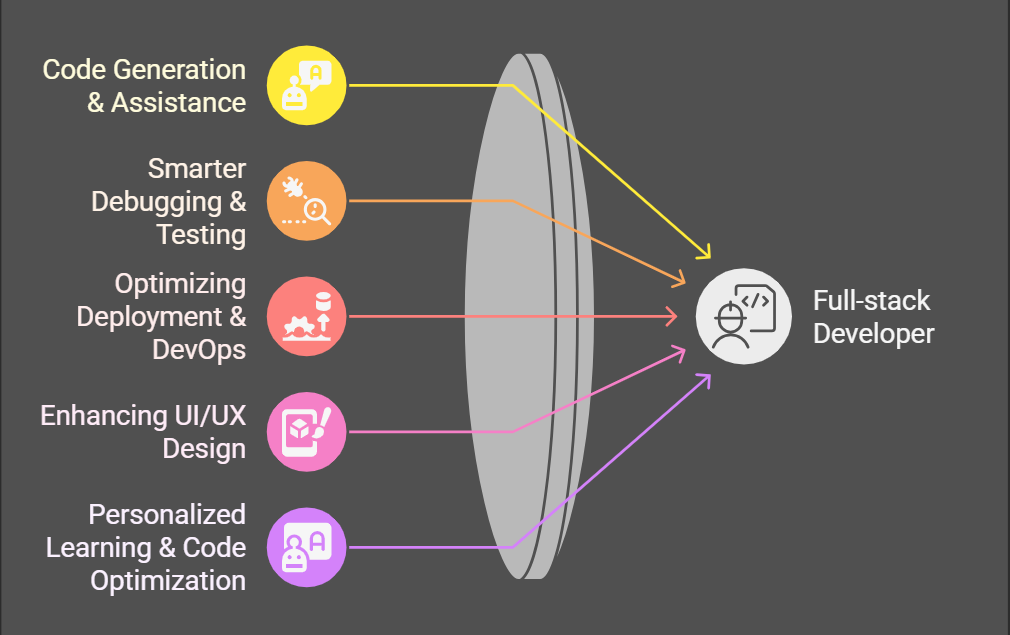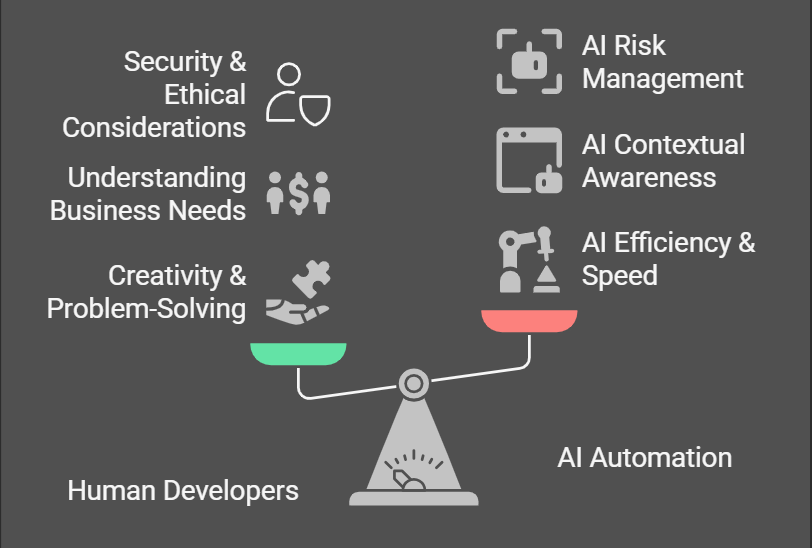
Full-Stack Development
A Full-Stack Developer is someone with expertise in both frontend and backend development. They handle everything from designing an intuitive and functional UI to managing the database and server-side logic. Their broad skill set allows them to oversee an entire development project, making them an indispensable part of any tech team.
Artificial Intelligence (AI)
Artificial Intelligence refers to technologies that enable machines to perform tasks that typically require human intelligence, such as decision-making, pattern recognition, and problem-solving. AI can think and learn faster than humans, without needing constant instructions or guidance.
How AI is Helping Full-Stack Developers

Rather than replacing developers, AI is enhancing their ability to work more efficiently and effectively. Here’s how AI is already playing a crucial role:
Assistance and Generation of Code
AI helps developers by providing code suggestions, automating repetitive tasks, and even refactoring code. This reduces errors and speeds up the development process. Examples: GitHub Copilot: Offers context-based code suggestions, helping developers save time and avoid repetitive tasks. ChatGPT: Explains complex concepts, helps with boilerplate code, and assists in debugging errors. Tabnine: Increases productivity by predicting code completions using deep learning models.
Intelligent Debugging and Automated Testing
AI-powered tools assist in testing and debugging by detecting problems quickly and recommending solutions. These tools can identify edge cases and vulnerabilities, which might otherwise be missed. Examples: Testim and Applitools: Use AI to automate testing, reducing the amount of manual labor. DeepCode and CodeQL: Detect security flaws early in the development process. Selenium and Cypress: When combined with AI, test automation becomes more dynamic and self-healing.
Improving Deployment and DevOps Optimization
AI helps forecast issues, optimize cloud infrastructure, and streamline the deployment process. By providing real-time data analytics, AI allows teams to address bottlenecks and improve system performance before they affect users. Examples: AWS AI-driven tools and Kubernetes: Automate scaling and resource allocation. Datadog: Offers real-time performance monitoring. AI-assisted CI/CD pipelines: Reduce human error by automating deployment processes.
Enhancing UI/UX Design
AI-driven design tools assess user behavior, suggest improvements, and help optimize user interfaces. Additionally, AI can automatically conduct A/B testing and create design variations to ensure the best user experience. Examples: Figma AI: Helps designers build accessible and responsive interfaces. Adobe Sensei: Suggests design changes to enhance user engagement. AI-powered chatbots: Use machine learning to offer real-time user support, improving the overall interaction experience.
Code Optimization and Personalized Learning
AI tools can analyze a developer’s code and offer tailored recommendations for optimization. By providing real-time feedback, AI helps developers learn and grow while improving the quality of their code. Examples: Replit AI Tutor: Gives real-time feedback to assist developers in their learning journey. Codacy and SonarQube: Review code to ensure best practices are followed, helping maintain clean and efficient codebases.
Why AI Will Not Replace Full-Stack Developers

While AI is a fantastic assistant, it lacks some essential qualities that human developers bring to the table:
Creativity and Problem-Solving
Writing code is not just about automation—it requires creativity and critical thinking. AI can suggest solutions, but it cannot think through complex problems or come up with innovative ideas. Developers are needed to make calculated decisions when approaching difficult issues.
Understanding Business Requirements
AI can’t fully grasp the business context behind a project. Developers must understand business objectives, domain knowledge, and the trade-offs involved in meeting those needs. This human element is crucial to the success of a project and something AI is far from mastering.
Ethical and Security Considerations
AI doesn’t have the intuition necessary to make ethical decisions. Developers must carefully assess AI-generated code to ensure there are no security vulnerabilities or ethical concerns.
Continuous Maintenance and Flexibility
Software systems require ongoing updates and flexibility to adapt to changing needs. AI cannot handle long-term maintenance or make decisions about system architecture. Only human developers can adapt legacy code, scale systems, and implement updates based on evolving business needs.
Team Collaboration and Communication
Software development is a highly collaborative process, requiring regular communication between developers, product managers, designers, and other stakeholders. AI cannot engage in meaningful conversations, decision-making, or brainstorming sessions. Effective collaboration remains a key aspect of development that only humans can manage.
The Future: Developers and AI Working Together
Rather than replacing developers, AI is here to enhance their capabilities. By automating repetitive tasks and providing powerful insights, AI allows developers to focus on more complex and creative aspects of the development process. The future lies in collaboration, with AI providing support and developers using their expertise to drive innovation.
How Developers Can Adapt to AI-Driven Development
To thrive in an AI-driven development environment, developers need to embrace AI and integrate it into their workflows. Here are some ways developers can stay relevant:
Learn AI-Powered Development Tools
Become familiar with AI-assisted tools and integrate them into your daily development tasks. Knowing how to use these tools will enhance productivity and ensure that you stay ahead of the curve.
Focus on Problem-Solving
While AI can write code, it still can’t solve complex business problems. Developers should focus on improving their problem-solving skills, ensuring that they can create scalable and maintainable systems that meet business needs.
Stay Updated with Technological Advancements
Keep learning about AI, cloud computing, and machine learning trends. Understanding these technologies will enable you to incorporate them into your projects intelligently.
Develop Soft Skills
AI cannot replace communication, teamwork, or leadership. These human skills will always be in demand. Developers should work on improving these abilities to collaborate effectively with their teams and stakeholders.
Participate in Open-Source AI Projects
Get involved in open-source AI initiatives to better understand the technology’s capabilities and limitations. This will keep you engaged with the latest developments and allow you to contribute to AI-driven projects.
Conclusion
AI is undoubtedly transforming full-stack development, but rather than replacing developers, it’s changing how they work. AI can handle repetitive tasks, suggest optimizations, and automate debugging, freeing developers to focus on problem-solving, creativity, and innovation. Tools like GitHub Copilot and ChatGPT are already boosting productivity, but human expertise in areas like designing architecture, understanding business goals, and making critical decisions will always be essential.
The key to staying relevant is adaptability. Developers who learn to collaborate with AI and leverage its strengths will have a competitive edge in the industry, ensuring that they remain in demand in the future.